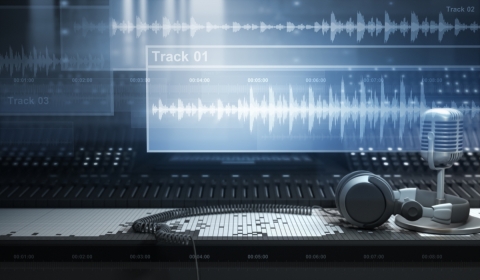
Blog Synopsis:
- Have you ever wondered why your voice sounds different on a recording?
- This is a frequently ask question we receive from patients who have a general interest in how their ears, nose, and throat work.
- In this blog, the physicians at AOC take the time to explain why your voice sounds different on a recording.
Every once in a while, the team at AOC likes to answer frequently asked questions from patients who are curious about certain ear, nose, and throat functions. Today, we’re discussing why your voice sounds different on a recording compared to when you speak out loud. To best explain why this phenomenon occurs, you have to first understand the fundamentals of sound. Simply stated, sound is produced by continuous vibrations that originate from a type of energy.
When an object vibrates, it causes air particles to move and bump into one another. These movements are called sound waves, and they keep moving until they run out of energy. If you are close to this range of vibrations, you will hear whatever sound is being produced. For example, if you listen to a recording of your voice from a speaker, that sound will travel as a series of vibrations through the air until it enters your ear and vibrates your ear drum.
The eardrum then passes these vibrations on to three little bones in your ear, the malleus, incus, and stapes. These bones further move the vibrations along to a spiral structure in the ear called the cochlea, which then sends the vibrations off to become nerve signals. These nerve signals travel up to the brain, and your brain interprets the sound you’re listening to.
Now, your voice sounds different in a recording versus out loud for one distinct reason: your vocal chords. When you speak out loud, your vocal chords vibrate, creating additional vibrations in your skull. These vibrations originate from the vocal cords and skull, and travel into your eardrum; creating the sound you hear when you speak out loud.
Another thing to keep in mind, when these vibrations are traveling through your bones, they spread out, lowering the notes and frequencies you hear when you speak. What you hear in a recording may sound much higher than what you hear when you speak, because your talking voice gives you a false sense of bass.
The reality is, what you hear in a recording is actually what you sound like to others. If you have any other interesting questions regarding your ears, nose, and throat, don’t hesitate to ask your AOC physician. He or she will be able to explain why some things are the way they are, and discuss what therapies may be best for your ENT needs.
Arizona Otolaryngology Consultants (AOC) is a comprehensive ENT clinic that provides care for all diseases of the ears, nose, throat, and sinuses. The physicians at AOC have the highest level of training and expertise in ENT care and ENT subspecialty care, which includes the management of pediatric airway, cancer, skull base surgery, advanced head and neck surgical and reconstructive procedures, craniofacial surgery and more. Call 602-264-4834 to request an appointment today!
The advice and information contained in this article is for educational purposes only and is not intended to replace or counter a physician’s advice or judgment. Please always consult your physician before taking any advice learned here or in any other educational medical material.
